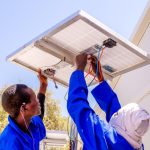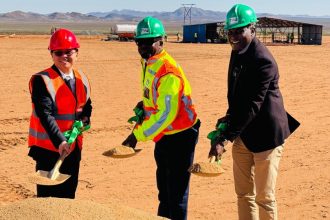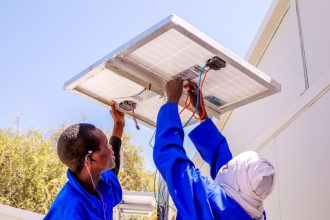Namibia has been invited to participate in the multilateral Climate Investment Fund’s (CIF) ground-breaking US$1 billion Industry Decarbonisation Investment program, the first global concessional finance initiative dedicated to reducing industrial greenhouse gas (GHG) emissions in developing countries.
Namibia was chosen from 26 global applicants and has now been invited to craft an investment plan that outlines how it plans to mobilise up to US$250 million (about N$4.5 billion) of concessional capital to pioneer industry decarbonisation within its borders and beyond.
Through the deployment of concessional funding, the program is designed to support the private sector in developing clean technology supply chains, catalyse investment in low to net-zero carbon business models, and drive the regional transition of high-emitting industries toward zero-carbon practices. The CIF notes that in the process, the program aims to position recipient countries for long-term economic competitiveness and will enable them to take advantage of the global market for green industrial goods projected to reach US$2 trillion by 2030.
Finance Minister Ericah Shafudah said the government was committed to mobilising fit for purpose capital as espoused in its Development Finance Report which recognised the utility of blended financing as a key instrument to engender socio-economic emancipation.
“We are excited to work closely with our private sector and our development partners to build future proof industrial clusters that can deliver the sustainable growth, employment opportunities, and economic diversification we seek,” she said.
James Mnyupe, Head of the Namibia Green Hydrogen Programme (NGHP) said the country’s application and subsequent selection to develop an investment plan, marks a critical milestone in Namibia’s industrial transformation journey.
“The CIF Industry Decarbonisation program will enable us to demonstrate how concessional finance can de-risk pioneering investments in green industries while ensuring the region’s transition is just, inclusive, and aligned with its developmental priorities. We are proud to have worked closely with our government and Ninety One to have crafted what has been recognised as a pioneering vision for our country and indeed Southern Africa.
“We look forward to co-developing an investment plan aligned with our forthcoming Sixth National Development Plan (NDP6). Green industrialisation will be a key driver of inclusive economic growth, job creation, and progressive climate action for Namibia,” said Mnyupe.
Namibia’s successful application ranked third globally and is expected to catalyse significant co-financing from multilateral development banks and private sector partners and aligns with the country’s national objective to attract foreign direct investment.
With support from the CIF, Namibia intends to:
- Catalyse green industrialisation by developing critical minerals, green hydrogen, and renewable energy value chains;
- Transform its electricity sector by enhancing energy independence and security through clean energy deployment;
- Support decarbonisation of regional power pools, encouraging integration and cleaner energy exchanges across Southern Africa;
- Promote inclusive development through the creation of green jobs, local and regional value addition and broader access to energy and;
- Undertake institutional strengthening through capacity building to support a just and equitable transition, grounded in gender inclusive strategies.
By strategically deploying CIF funding, Namibia will showcase how smaller nations can lead the energy transition through innovation and regional cooperation.
CIF Chief Executive Officer Tariye Gbadegesin said the global race to decarbonise industry has begun, and emerging markets are out in the front.
“Decarbonising Industry is about more than emissions – it’s about securing long-term prosperity and the jobs of tomorrow. And it’s about producing the low-carbon industrial inputs that are urgently needed to expand renewable energy capacity and power the global economy,” she said.
Anthony Nyong, Director for Climate Change and Green Growth at the African Development Bank (AfDB) noted that industrial decarbonisation is not only essential for reducing emissions, but it also presents a transformative opportunity for inclusive and sustainable growth across Africa.
“As one of the fastest-growing regions after Southeast Asia, with a relatively clean baseline, Africa is uniquely positioned to leapfrog towards a zero-emission, climate-resilient future. Investing in Africa’s decarbonisation sector offers high-impact, efficient, and inclusive outcomes. AfDB is proud to partner with CIF on this pioneering initiative, which will support countries in charting low-carbon industrial pathways, creating green jobs, and enhancing global competitiveness in climate-smart industries,” he said.
Nazmeera Moola, Chief Sustainability Officer at Ninety One, said: “Namibia’s selection for the CIF program shows just how big the opportunity is for emerging markets to lead in the move towards cleaner, more sustainable industries. What matters now is turning that opportunity into real, lasting impact.”
Eino Emvula, Managing Director of Ninety One Africa (excluding South Africa), remarked that with the CIF’s support, Namibia has a real opportunity to grow its economy in a cleaner, more sustainable way, enhance its energy independence and serve as a model for other emerging markets.
“At Ninety One, we’ve seen first-hand how well-deployed capital can transform economies and uplift communities. By building sustainable industries from the ground up, Namibia can set a compelling example for other emerging markets striving to reach net zero in a way that works for their people and their future,” said Emvula.
Practice Manager, Energy Sector Management Assistance Program (ESMAP) at the World Bank, Chandrasekar Govindarajalu, said he looks forward to supporting the countries that have been selected to develop an investment plan for the CIF Industry Decarbonisation investment program.





